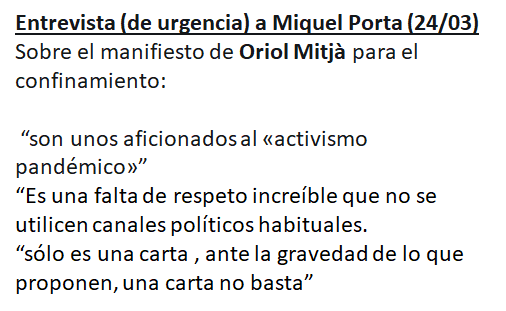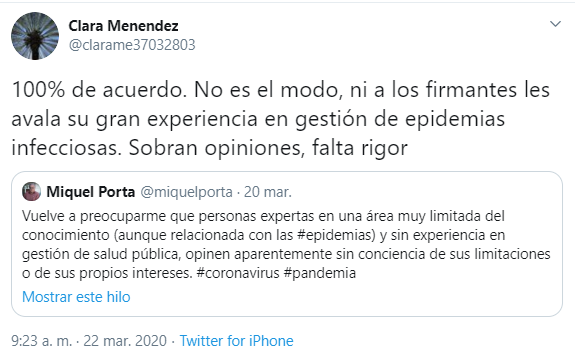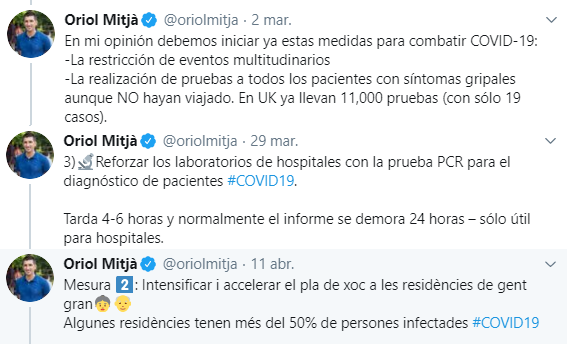(https://twitter.com/oriolmitja/status/1291711671631843328)
¿Se cometieron errores? Sí.
¿Algunos ya quisimos avisar y nos criticaron duramente por ello? También.
4 meses, 300 mil casos y 40 mil muertes después, científicos y periodistas nos dan ahora la razón, pero ya es tarde para salvar las vidas perdidas.
La élite científica reclama un examen independiente de los fallos de España en la pandemia
2020 abu. 7
Me alegro de que compañeros pidan ahora que se estudien los errores en la gestión para no volver a repetirlos Pero me duele que
criticaran entonces (en fondo y forma) lo que ahora firman en la carta de

2020 abu. 7
Entonces
y compañía dijeron que no teníamos conocimiento ni experiencia en la gestión de epidemias. Espero que la próxima vez sepan que todos debemos remar a una para combatir al Covid-19.
2020 abu. 7
La carta en
apunta ahora que los factores que condujeron al fracaso de la gestión en España, fueron:
•la falta de preparación de los sistemas de vigilancia
•la reacción retardada de las autoridades
2020 abu. 7
Oriol Mitjà@oriolmitja
erabiltzaileari erantzuten
Otros factores que contribuyeron en el fracaso fueron:
•la falta de pruebas PCR
•la falta de preparación de hogares de ancianos
2020 abu. 7








joseba says:
The need for an independent evaluation of the COVID-19 response in Spain
(https://www.thelancet.com/journals/lancet/article/PIIS0140-6736(20)31713-X/fulltext)
Alberto García-Basteiro
Carlos Alvarez-Dardet
Alex Arenas
Rafael Bengoa
Carme Borrell
Margarita Del Val
Manuel Franco
Montse Gea-Sánchez
Juan Jesús Gestal Otero
Beatriz González López Valcárcel
Ildefonso Hernández
Joan Carles March
José M Martin-Moreno
Clara Menéndez
Sergio Minué
Carles Muntaner
Miquel Porta
Daniel Prieto-Alhambra
Carmen Vives-Cases
Helena Legido-Quigley
Spain has been hit hard by COVID-19, with more than 300 000 cases, 28 498 confirmed deaths,1
and around 44 000 excess deaths, as of Aug 4, 2020.2
More than 50 000 health workers have been infected, and nearly 20 000 deaths were in nursing homes.3
With a population of 47 million, these data place Spain among the worst affected countries. Spain is also reported to have one of the best performing health systems in the world4
and ranks 15th in the Global Health Security index.5
So how is it possible that Spain now finds itself in this position?
Potential explanations point to a lack of pandemic preparedness (ie, weak surveillance systems, low capacity for PCR tests, and scarcity of personal protective equipment and critical care equipment), a delayed reaction by central and regional authorities, slow decision-making processes, high levels of population mobility and migration, poor coordination among central and regional authorities, low reliance on scientific advice, an ageing population, vulnerable groups experiencing health and social inequalities, and a lack of preparedness in nursing homes. These problems were exacerbated by the effects of a decade of austerity that had depleted the health workforce and reduced public health and health system capacities.
A comprehensive evaluation of the health and social care systems is now needed to prepare the country for further waves of COVID-19 or future pandemics, identifying weaknesses and strengths, and lessons learnt. We are calling for an independent and impartial evaluation by a panel of international and national experts, focusing on the activities of the Central Government and of the governments of the 17 autonomous communities. This evaluation must include three areas: governance and decision making, scientific and technical advice, and operational capacity. Moreover, the social and economic circumstances that have contributed to making Spain more vulnerable, including rising inequalities, must be considered.
Specific concerns include public health functions, leadership and governance, financing, health and social workforce, health information systems, service delivery, access to diagnosis and treatment, the role of scientific research, and the experience and values of individuals, communities, and vulnerable groups.
This evaluation should not be conceived as an instrument for apportioning blame. Rather, it should identify areas where public health and the health and social care system need to be improved. Although this type of evaluation is not usual in Spain, several institutions and countries, such as WHO6
and Sweden,7
have accepted the need for such a review as a means towards learning from the past and preparing for the future.
We encourage the Spanish Government to consider this evaluation as an opportunity that could lead to better pandemic preparedness, preventing premature deaths and building a resilient health system, with scientific evidence at its core.
AA has advised the Spanish and Catalan Governments. BGLV is a member of the multidisciplinary working group on COVID-19 for the Ministry of Science and Innovation of Spain, a member of the scientific committee on COVID-19 for the Government of the Canary Islands, Spain, and a member of the COVID-19 group of the Medical Council of Spain. IH has assessed two regional Spanish Goverments on COVID-19. All other authors declare no competing interests.
References
1.
Ministerio de Sanidad
Actualización no 177. Enfermedad por el coronavirus (COVID-19).
https://www.mscbs.gob.es/en/profesionales/saludPublica/ccayes/alertasActual/nCov-China/documentos/Actualizacion_177_COVID-19.pdf
Date: Aug 4, 2020
Date accessed: August 4, 2020
View in Article
Google Scholar
2.
Instituto de Salud Carlos III
Vigilancia de los excesos de mortalidad por todas las causas: MoMo.
https://www.isciii.es/QueHacemos/Servicios/VigilanciaSaludPublicaRENAVE/EnfermedadesTransmisibles/MoMo/Documents/informesMoMo2020/MoMo_Situacion%20a%2019%20de%20julio_CNE.pdf
Date: July 19, 2020
Date accessed: July 24, 2020
View in Article
Google Scholar
3.
Ministerio de Sanidad
Actualización no. 169: enfermedad por el coronavirus (COVID-19).
https://www.mscbs.gob.es/profesionales/saludPublica/ccayes/alertasActual/nCov-China/documentos/Actualizacion_169_COVID-19.pdf
Date: July 23, 2020
Date accessed: July 24, 2020
View in Article
Google Scholar
4.
Fullman N Yearwood J Abay SM et al.
Measuring performance on the Healthcare Access and Quality Index for 195 countries and territories and selected subnational locations: a systematic analysis from the Global Burden of Disease Study 2016.
Lancet. 2018; 391: 2236-2271
View in Article
Scopus (141)
PubMed
Summary
Full Text
Full Text PDF
Google Scholar
5.
Nuclear Threat InitiativeJohns Hopkins Bloomberg School of Public Health
Global Health Security index: building collective action and accountability.
https://www.ghsindex.org/wp-content/uploads/2019/10/2019-Global-Health-Security-Index.pdf
Date: October, 2019
Date accessed: July 21, 2020
View in Article
Google Scholar
6.
WHO
Independent evaluation of global COVID-19 response announced.
https://www.who.int/news-room/detail/09-07-2020-independent-evaluation-of-global-covid-19-response-announced
Date: July 9, 2020
Date accessed: July 21, 2020
View in Article
Google Scholar
7.
Swedish Ministry of Health and Social Affairs
Mats Melin to chair COVID-19 inquiry in Sweden.
https://www.government.se/press-releases/2020/06/mats-melin-to-chair-covid-19-inquiry-in-sweden